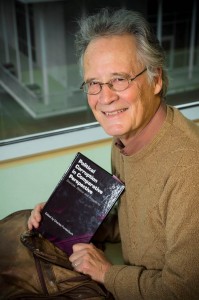
Political science professor Charles Funderburk with the book Political Corruption in Comparative Perspective, which he and six other faculty members partnered to produce.
When political science professor Charles Funderburk came up with the idea to write a book on political corruption, several other Wright State faculty members expressed an interest in helping. Then another…then another…then another.
In the end, seven Wright State faculty members partnered to produce Political Corruption in Comparative Perspective, a collection of case studies published in 2012 after nearly three years of work.
“It was really good for our department,” Funderburk said. “An exercise in camaraderie came out of it. And the nice thing about working with colleagues here at Wright State is that they were just down the hall where I could bang on their door and ride herd on them.”
Funderburk said there have been previous efforts to write all-encompassing books about political corruption, but that he wanted authors who were familiar with specific areas. The book moves from one country to another using a common framework
“Certainly I hope it will spark some interest in the subject and a slightly different way of looking at it, perhaps a little more broadly conceptualized,” he said. “Ideally, I’d like to see enough interest to produce a paperback. Then more people can read it.”
The book reviews and analyzes political corruption in the United States, Brazil, Russia, China, South Asia, Israel and several other countries. Funderburk wrote a chapter on political corruption in the United States and the introductory chapter titled Political Corruption Causes and Consequences.
Writes Funderburk: “Consequences of widespread political corruption for societies include lower rates of economic growth, slower development of economic and political institutions, widespread cynicism and alienation among the populace undermining the legitimacy of the state, and in some cases political and social instability.”
Funderburk said he was especially interested in analyzing the kinds of things that could be viewed as corrupt but have been legalized and institutionalized such as large campaign contributions and earmarks, legislative provisions that direct funds to be spent on specific, often parochial, projects.
“Often when you start introducing these earmarks for special interests, money really flows that way,” he said. “It’s not that hard to find overtly corrupt examples of congressmen and senators who, in the guise of earmarking legislation for special needs, end up essentially on the take.”
The Wright State faculty members who contributed to the book were Funderburk; Donna Schlagheck, chair of the Department of Political Science; professor Liam Anderson; December Green, director of the International Studies program; Pramod K. Kantha, who teaches South Asian politics; Laura M. Luehrmann, director of the master’s program in Comparative and International Studies; and Vaughn P. Shannon, who teaches international and Middle Eastern politics. Also contributing was Julie Fisher, a former program officer and associate at the Kettering Foundation.
Funderburk grew up in Jacksonville and Miami, Fla. He obtained his bachelor’s and master’s degrees in political science from the University of Florida and his Ph.D. in political science from the University of Iowa.
Funderburk has spent the past 40 years at Wright State. He plans to retire in June.
“I’ll still be lurking the halls. I’ll be teaching a course in the fall, and I suspect that for probably several years I’ll teach part time,” he said. “But it will be nice to slow the pace down.”
The slowdown will enable Funderburk to spend more time with his other passions, such as reading.
He favors Elmore Leonard, who originally wrote westerns and moved on to suspense thrillers and crime fiction such as Get Shorty. He also enjoys reading journalist Carl Hiaasen, whose novels are set in Funderburk’s native Florida, and Randy Wayne White, who has written several novels with Florida’s Gulf Coast as their backdrop.
“And I’ve got a guitar I hack on from time to time,” Funderburk added.

 Wright State psychology team studies ways to identify fatigue in pilots, drivers
Wright State psychology team studies ways to identify fatigue in pilots, drivers  Wright State videographer Kris Sproles wins Regional Emmy and Ohio journalism award
Wright State videographer Kris Sproles wins Regional Emmy and Ohio journalism award  Wright State Boonshoft School of Medicine ranked among the nation’s best for 2024 by U.S. News
Wright State Boonshoft School of Medicine ranked among the nation’s best for 2024 by U.S. News  Exposing biotechnology
Exposing biotechnology  Wright State faculty member Dan Noel uses unique background to inspire new leaders
Wright State faculty member Dan Noel uses unique background to inspire new leaders 